Thailand is one of the top scuba diving spots in the world due to its tropical environment and crystal-clear seas. With 349 identified dive sites, warm water, and low-cost training, Thailand is a popular place for divers to begin their diving experiences. Many pelagics may be seen, as well as lesser fish and animals.
Many dive locations include gorgeous hard and soft coral as well as a plethora of marine life. Thailand dive schools have a strong reputation, which is why it is regarded as one of the finest places to learn scuba diving or improve your abilities as a licensed diver. Thailand is one of the top scuba diving locations in Southeast Asia due to its abundance of large and tiny marine life, wrecks, and dive sites for divers of all skill levels.
The Best Places to Scuba Dive in Thailand
The Sail Rock at Koh Tao
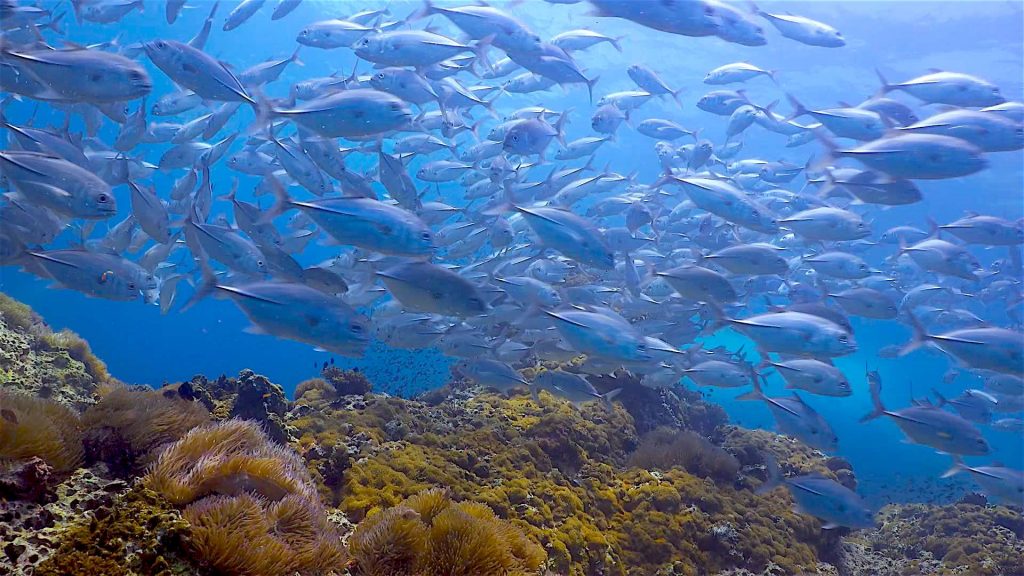
The island of Koh Tao is an excellent diving location. There are dozens of islands off the coast, but this specific island is still many travelers’ preferred pick for exploration beneath the water. The location is roughly a 90-minute boat sail from the island, but the gorgeous trek is well worth it. Divers can see the rock rising out of the Gulf of Thailand as they approach it, as it is eight meters above the water.
Since it is so far from the island, the marine life is both diverse and distinct, apparently unspoiled by the visitors that visit Koh Tao. Divers can approach and descend to around eight meters while within the rock at about five meters depth.
The Surin Islands
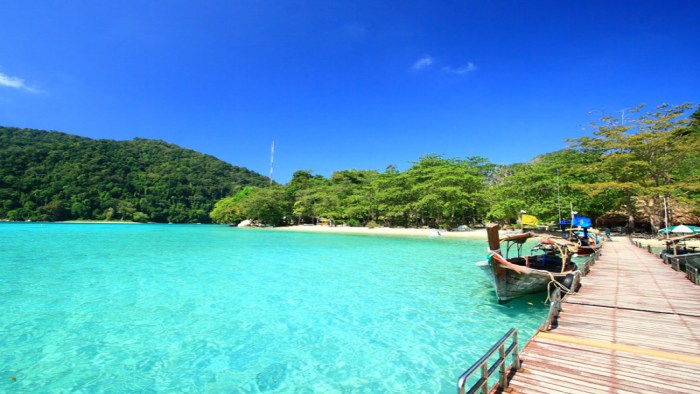
Manta rays and whale sharks are among the marine creatures found in the Andaman Sea. The clarity is as clear and transparent as that of a glass jar. It should come as no surprise, therefore, that some of the world’s top snorkeling and diving spots can be found around. This string of islands is located in the Tha district of Phang Nga and is considered the most isolated, being 37 miles from Thailand’s west coast.
Travelers are less likely to visit since it is so distant from the mainland, leaving it both isolated and unspoiled by visitors. This is primarily owing to the island’s status as a UNESCO World Heritage Site.
The HTMS Chang at Koh Chang
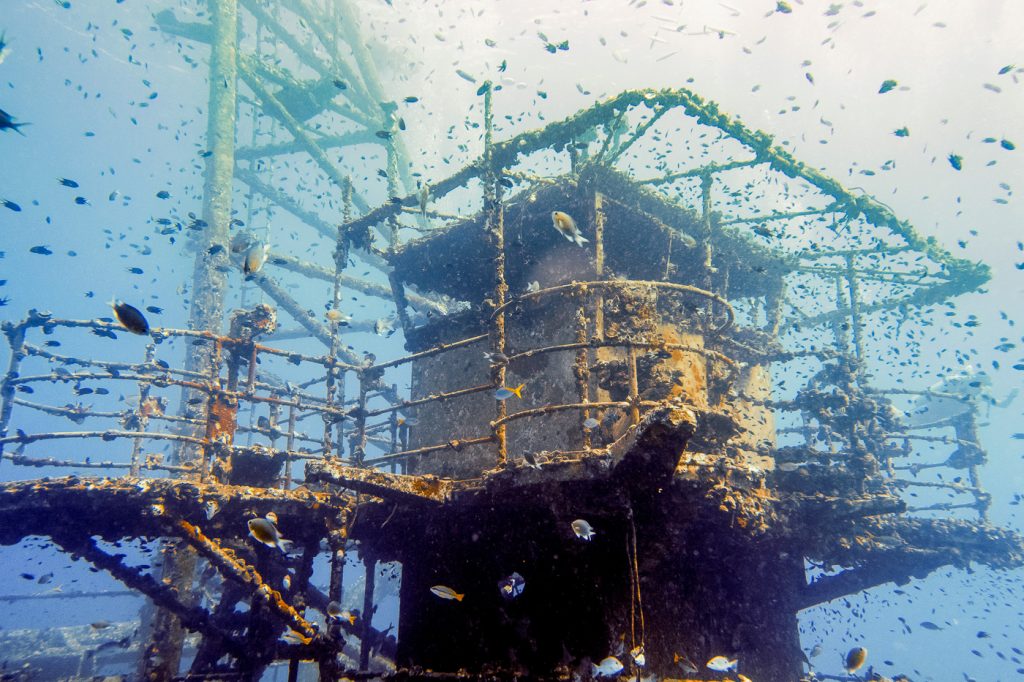
Some divers like the artificial reef they are about to visit, which may be as beautiful as natural reefs. Others love the spooky atmosphere created by a sunken vessel, as the rotting hull contains nothing but marine life where people and commodities once resided.
Fortunately for divers visiting Thailand, there are numerous shipwrecks worth investigating along the shore. It is about four miles off the shore of the island. The base of the vessel is 30 meters deep at its deepest point, and the vessel itself is 100 meters long, making it the largest wreckage in the nation.
The Island of Koh Ma
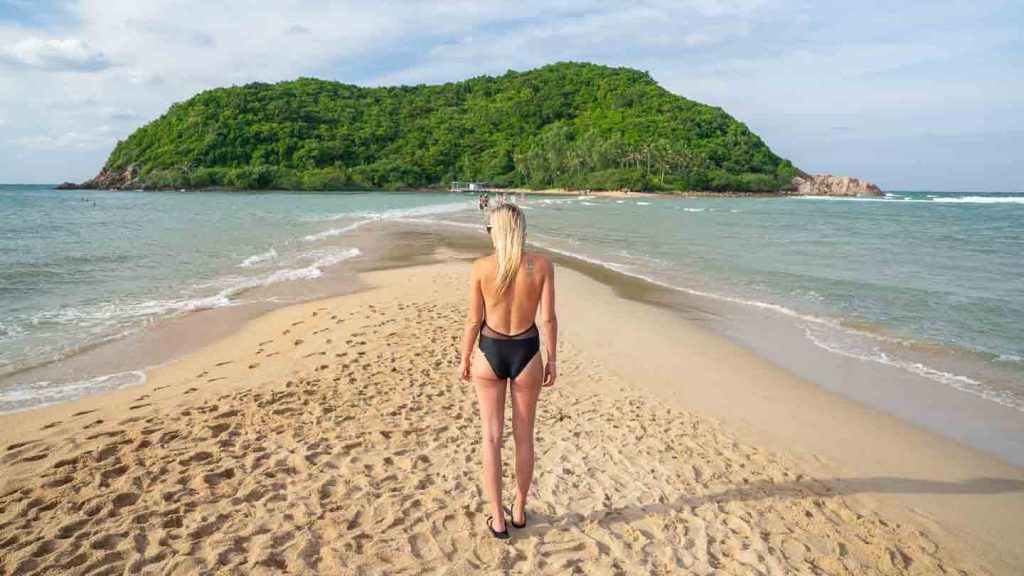
Divers new to the sport will be glad to learn that Koh Ma, located off the island of Koh Phangan, is an excellent location for those seeking to become qualified for the first time or to brush up on their diving abilities. It’s not far from Koh Phangan’s Mae Haad Beach, yet it’s nonetheless home to a multitude of aquatic life, like colorful parrotfish and aggressive barracudas.
The island is only connected to Koh Phangan by a sandbar, making it very simple to reach without a boat or other kind of transit. In addition to being a perfect place for beginning divers, the island has a few hotel alternatives, offering it a peaceful retreat from the crowded island of Koh Phangan.
The Similan Islands
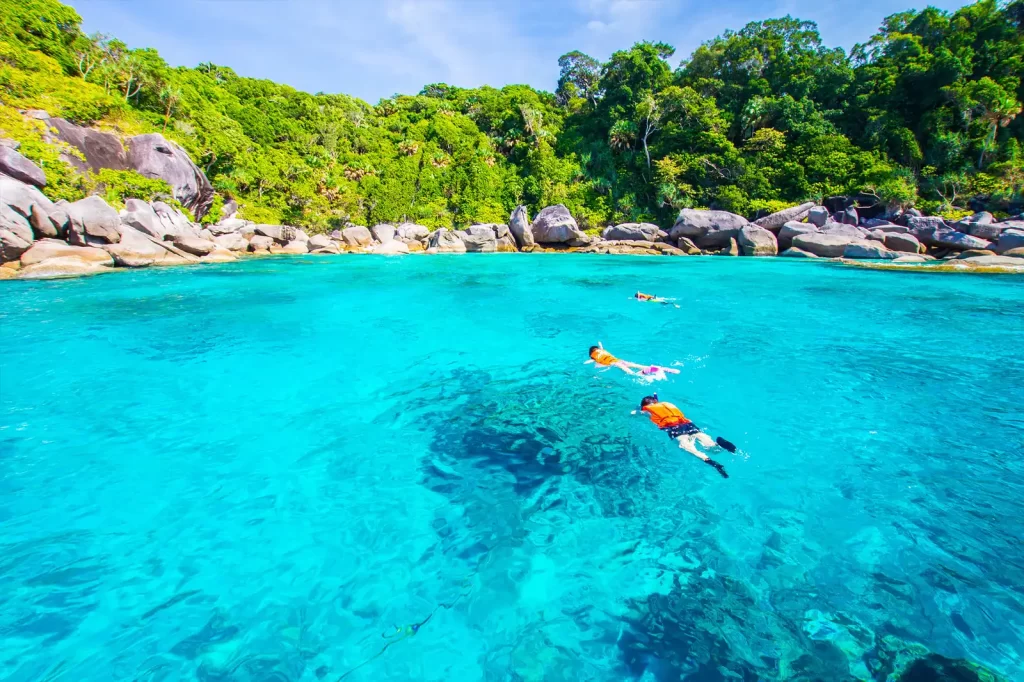
The Similan Islands are around 50 kilometers from Phuket. The Thai government protects all eleven remote islands inside the Mu Koh Similan National Park. This is one of the grounds why these islands have some of the greatest diving sites in Thailand, and some may claim the most beautiful on the entire planet.
The King Cruiser at Phuket

Phuket may draw hordes of travelers with its promise of a booming nightlife, but the island also offers several magnificent diving spots to undersea explorers. The King Cruiser shipwreck is one of the most well-known. The wreck, which has been buried for over 40 years, has drawn a diverse range of aquatic life, and coral continues to render both the inside and outside of the ship both spooky and magnificent.
Vital Scuba Diving Tips
Scuba diving is a popular leisure activity. Scuba divers may go underwater to depths of up to 130 feet. then breathe through a mouthpiece connected to a pressurized air tank It is critical to understand the safety precautions and key facts to ensure your safety.
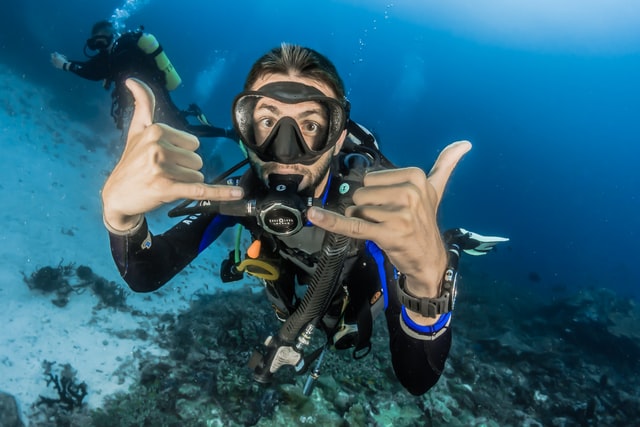
✔️Make Certain You Are Dive-Certified
Depending on what type of dive, some dive operators need confirmation of dive qualification and/or specialty expertise. Before you go or begin diving on your trip, always obtain your dive certification from a certified dive operator. Some operators provide beginner diving training; however, this does not permit you to dive anytime and anywhere you wish.
✔️Dive with a Professional Diving School
Look online for reputable diving schools in the region you’re visiting. It is critical to know that they are well-established and have well-maintained diving equipment and boats, as well as skilled staff.
✔️Inspect All of Your Scuba Gear
You’ll need to set up all of your diving gear on the way to the dive location. Take your time and double-check that everything is in good condition. Don’t be afraid to question your guide or teacher if you’re unsure about anything.
✔️Breathe Normally at all Times
Scuba diving is an unusual and thrilling activity because you are doing something theoretically impossible — breathing underwater. It is critical to never hold your breath during scuba diving; instead, breathe properly at all times. Trying to hold your breath can result in an air embolism, a potentially fatal injury.
✔️Keep track of where your Guide is at all Times
When you see anything fascinating, don’t be tempted to go off on your own; instead, alert your guide and dive partner and move towards it together. Remaining with your companion and guide is critical for your safety and direction. If you happen to lose each other underwater, look about for a minute and if you still can’t find them, gently climb to the surface.
✔️Nothing Should be Touched
It is best not to touch anything to conserve the coral reefs. Many corals are razor-sharp, much marine flora is toxic, and many sea critters may bite if attacked. Maintaining your hands to yourself keeps you and your loved ones secure and unhurt. It’s also critical to develop your buoyancy so you can glide effortlessly over the reefs without feeling the need to grab anything.
✔️Check to See if You’re Fit to Dive
If you’ve never dived before, you should have a medical check in your home nation to guarantee you’re fit to dive. If you’re typically active and healthy, you should be OK. When learning to dive, you will be needed to sign a medical declaration. If you’re already qualified to dive, resist diving if you’re not feeling 100%.
✔️Keep a Sharp Eye on your Air Pressure Gauge
You can only remain below for as much as you have air in your tank, and you must be mindful of when your tank is half-filled and a quarter full to plan your comeback to the surface. Your advisor will regularly ask you however much air you have left, but you are ultimately accountable for your own air use.
✔️Don’t Push Yourself Too Far
Diving is frequently referred to be an adrenaline sport, although you should really be quite calm while underwater. Swimming swiftly over reefs is pointless; the slower you go, the more you’ll see. Avoid moving at a rate that causes you to become out of breath. If you get fatigued, alert your friend and pick a coral-free rock to rest on.
✔️Rise Gradually from Every Dive
Aside from avoiding holding your breath, the main rule of diving is to rise carefully from a dive. Coming up quickly after a dive might produce “the bends” or decompression sickness because nitrogen is pushed into the circulation. Coming up gently from a dive and performing the safety stop allows the nitrogen in your body to evaporate and so do no harm.
✔️Briefing with Your Guide
Evaluate how the dive went and write notes on what you can do better the next time to maximize pleasure and safety. Keep a record of the weight you used; this will assist you in getting your weighting accurate on your next dive.
Great Advantages While Scuba Diving
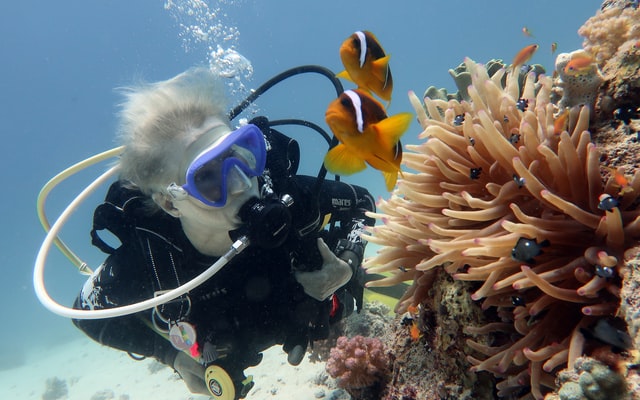
👍You Improve your Strength and Flexibility
As you travel through the waters during a dive, your muscles work even harder than they would if you were not in the water. This is because of the force of the water as well as the stream. The more you plunge and swim, the more your muscles elongate, gain strength, stamina, and mobility. Scuba diving and swimming in water may help to develop not just your legs but also your core strength, which is crucial for excellent overall posture in your daily life.
👍It has the Potential to Lower Blood Pressure
When a diver initially enters the water, his or her heart rate and blood pressure may increase somewhat owing to anticipation or the cold water. The majority of the dives take place in water that is colder than our body temperature. If we are submerged in cold water, our blood vessels on the exterior of our bodies contract to save heat for our interior organs, causing our hearts to beat.
Our heart rate and blood pressure both decrease as we heat up throughout the dive. Deep breathing, which we learn throughout our open water diving training, can help drop your blood pressure and keep you relaxed during the dive. However, if you have high blood pressure, you should see a doctor before trying to scuba dive.
👍You will get the Opportunity to Interact with Marine Life
You will be overwhelmed with excitement, wonder, and amazement as you explore the aquatic life surrounding you on your dive. The sheer diversity of fish, corals, and animals is enough to make anyone happy. However, it has been demonstrated that viewing specific colors may alter the brain in a variety of ways.
Certain colors might assist to alter and boost your mood. Scientists believe that being exposed to vivid and dramatic colors, such as those seen around reefs, can aid to enhance sentiments of happiness as well as sensations of being elevated. Furthermore, the color blue has been shown to have a relaxing impact on the body.
👍You get to Know New People
If you are not currently diving with a companion, you will be matched up with a companion when you go diving. These are typically like-minded folks who have a shared interest. It’s always simple to make new acquaintances and meet new people while you’re on a dive boat or diving from shore.
When scuba diving, it is also extremely simple to develop a sense of community and to frequently go out after your dives. It’s a fantastic feeling to have an incredible diving adventure and be ready to share it with your fellow divers.
👍You can Improve your Breathing
Dive breathing is deep and steady, which is critical for saving and regulating air intake. During a dive, you tend to breathe in and out slowly, which lowers your heart rate and promotes calm. Consistent breathing also lowers the likelihood of lung-expansion damage. This minimizes mucus buildup and has been shown to aid with pre-existing disorders.
👍You have the Ability to Improve your Fitness Levels
Before diving, a diver should be in good shape so that he or she does not overexert the body during the dive, which might endanger the diver. Scuba diving, on the other hand, may be rather unexpected, and as a result, you may find yourself swimming against the stream for a short period. This repetitive action of the legs against the force of the water can assist to maintain and develop your fitness levels.
👍Water has Healing Properties
Water has various medicinal properties. This encourages emotions of safety, well-being, and enjoyment. Furthermore, being in saltwater for extended lengths of time will dry your body. This will make you consume a lot more after the dive. Which indicates you are refilling your cells and enjoying all of the advantages of water both externally and inside.
👍There is Sunlight Exposure
The body must be accustomed to sunshine to produce Vitamin D, which not only speeds up calcium absorption but also allows cells to communicate with one another. This increased calcium absorption rate contributes to the health and strength of the bones. Sunlight also stimulates the creation of endorphins in our brains.
👍It Acts as a Stress Reliever
When we breathe during a dive, we begin to breathe slowly and gently, similar to how we breathe when concentrating. Slower breathing generates a mood of serenity, allowing the diver to enjoy their environment underwater.
This ‘time out’ allows the body to recover and restore the body’s and neurological system’s natural equilibrium. According to studies, having a relaxed and tranquil mind has been shown to foster a good mental attitude. This will allow you to cope with your concerns calmly and sensibly without experiencing emotions of depression.
Frequently Asked Questions
Q: Is Thailand a decent place to go scuba diving?
A: Thailand has some of the world’s top diving. Travelers from all over the globe visit the nation only for the opportunity to go scuba diving.
Q: How much does scuba diving in Thailand cost?
A: A day excursion costs around 3,400 Baht for two dives and 3,900 Baht for three dives. If you are going without your own diving equipment, a set of rental dive equipment costs 500 Baht.
Q: Is it safe for novices to go scuba diving?
A: Scuba diving is a safe activity for individuals of all sizes, ages, and skills. Thanks to stringent safety training and equipment standards it is possible.
Q: What is the first diving rule?
A: Never hold your breath and always breathe continually. The most crucial guideline in scuba diving is to breathe constantly, which is taught to scuba divers during open water qualification.
Q: When you cough during scuba diving, what happens?
A: Coughing into your regulator is entirely OK till your airway is clean. If you feel a tickling in the back of your throat, attempt to relocate to an open space where you won’t collide with anything.
Final Thoughts
If you wish to attempt scuba diving for the first time, Thailand is the ideal destination. Underwater, the country is stunning. You can see how the aquatic life thrives while also admiring the country’s overall beauty. And because Thailand is so beautiful, most people come specifically for scuba diving. It is always crucial to ensure that you follow all safety precautions while scuba diving.
